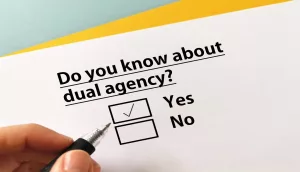As a home buyer in New York City, you may encounter a situation where a listing agent asks you to sign a ‘dual agency’ disclosure form. Agreeing to dual agency can be financially disadvantageous because it means you will not be able to request a rebate on the buyer’s agent commission. Additionally, dual agency involves several risks in real estate transactions, which we will explain in more detail below.
disadvantageous because it means you will not be able to request a rebate on the buyer’s agent commission. Additionally, dual agency involves several risks in real estate transactions, which we will explain in more detail below.
Pros and Cons of Dual Agency in NYC Real Estate (2025)
Go Back To Previous PageWhat is dual agency in NYC?
Dual agency in NYC real estate refers to a situation where the same broker or salesperson represents both the buyer and the seller in a single transaction. This can also occur when both the listing agent and the buyer’s agent work for the same firm.
Additionally, it is dual agency if a single broker or salesperson represents two parties in a mutually dependent transaction.
What are some examples of dual agency in NYC?
There are several scenarios in which dual agency may occur. Here are a few examples:
- The same broker represents both the buyer and the seller. Nicole Fishman at NestApple is currently marketing an exclusive listing. While 75% of the interested buyers are working with buyer’s agents, Nicole also encounters a few walk-in buyers who are not represented. If a walk-in buyer expresses interest in the property and decides to submit an offer, the listing agent may act as a dual agent for both the buyer and the seller.
- The same brokerage firm represents both the buyer and the seller. Dual agency can also occur when members of the same firm represent both the buyer and the seller. Even if the listing agent and the buyer’s agent have never communicated and work in different offices, their association with the same brokerage creates a dual agency situation.
- A mutually dependent transaction. In another scenario, Jeremy G. at Brokerage A is holding an open house for his exclusive listing in the West Village. An unrepresented buyer, who lives in the building, visits and expresses interest in the listing. However, the buyer mentions that he must first sell his current studio apartment before he can proceed with a purchase. If the listing agent agrees to represent this buyer in the sale of his apartment, allowing him to eventually buy Jeremy’s listing, this creates mutually dependent transactions. Consequently, this situation triggers a conflict of interest, also known as dual agency.
Is dual agency in New York illegal?
Dual agency is completely legal in New York; however, a real estate salesperson or broker must meet specific disclosure requirements before acting as a dual agent.
New York’s dual agency disclosure requirements went into effect on January 1, 2011, following the amendment of Section 443 of the New York State Real Property Law.
Why is dual agency a risk for both buyers and sellers?
Dual agency can be risky for both buyers and sellers, as it means that the salesperson or broker cannot provide undivided loyalty to either party. When you hire an agent to represent you, it typically establishes a principal-agent relationship, which is fiduciary in nature.
For example, a seller’s agent has certain fiduciary duties to the seller, including: reasonable care, undivided loyalty, confidentiality, full disclosure, obedience, and a duty to account. Similarly, a buyer’s agent has the same fiduciary duties to the buyer.
In a dual agency arrangement, it becomes impossible for the salesperson or broker to maintain undivided loyalty to both parties simultaneously.
Therefore, the primary reason for disclosure in a dual agency situation is to ensure that both the buyer and the seller understand that they are relinquishing their right to undivided loyalty.
What are the cons of dual agency in NYC?
Agreeing to dual agency as a buyer will eliminate your chance to automatically save money on your purchase by requesting a commission rebate from a NYC buyer’s agent.
Additionally, there are several other risks you should consider before signing a dual agency disclosure form as a buyer.
One key downside is that a buyer broker commission rebate won’t help you save money.
Requesting a buyer agent commission rebate in New York City (NYC) can effectively save you $20,000 or more on your sale price. The savings from this rebate can fully offset the NYC mansion tax and help reduce your closing costs. Commission rebates are especially advantageous in NYC because nearly all sellers agree to pay the average commission of 6%, regardless of whether the buyer has a real estate agent.
Therefore, deciding to be ‘unrepresented’ will not make your offer more attractive to the seller.
When your buyer’s agent represents you in a purchase, they receive half of the total commission that the seller pays, which is usually given to the listing agent. If you request a rebate, your buyer’s agent must return a portion of their earned commission to you in the form of a cash check at closing.
Commission rebates are completely legal in NYC; however, many buyers are unaware of them. Why is that? Broker commission rebates save consumers money, leading many brokers in the city to either refuse to offer them, deny their existence, or incorrectly claim they are illegal.
In fact, the New York State Attorney General encourages broker commission rebates to help reduce broker fees for consumers. Importantly, these rebates are generally not taxable by the IRS.
Additional Disadvantages of Dual Agency for Buyers:
- The listing agent may have interests that conflict with yours.
- They might not use the strategic information you provide about your offer price and financial situation solely for your benefit. Without someone to advocate for you during negotiations, you could be at a disadvantage.
- Keep in mind that a dual agent cannot negotiate on your behalf. This situation might cause you to overlook important details or potential issues with the apartment, condo, or co-op building you are considering.
Entering a dual agency agreement can be particularly risky when buying a co-op in NYC. The co-op board application process is strict, and rejections are relatively common. If the listing agent is overly ambitious, they might see you as a means to earn a double commission, regardless of whether you are the best fit for the co-op.
This incentive could lead the listing agent to steer you toward a co-op that may not be suitable, rather than selecting a more qualified buyer who has representation.
What are the pros of dual agency in NYC?
Agreeing to dual agency in NYC can simplify the purchasing process by improving efficiency and reducing timing issues. With only one agent representing both the buyer and seller, it becomes easier to coordinate property showings, negotiate prices, and prepare the board application when purchasing a co-op or condo.
However, as a buyer, it’s crucial to consider whether these benefits outweigh the drawbacks. Dual agency can limit your ability to request a buyer agent commission rebat,e and means you won’t have a dedicated advocate throughout the transaction.
Regardless of your decision, you can save money on your purchase by asking for a rebate on the buyer agent’s commission.
What are the disclosure requirements for dual agency in New York City?
If dual agency occurs, the broker or salesperson must adhere to specific disclosure requirements for both the buyer and the seller. These requirements include:
- Clearly explaining the existence of dual agency and its implications to both parties.
- Presenting both the buyer and the seller with a “New York State Disclosure Form for Buyer and Seller” to obtain written acknowledgment from each party consenting to dual agency.
You can find copies of the New York agency disclosure forms here:
- New York State Agency Disclosure Form for Buyer and Seller
- New York State Agency Disclosure Form for Landlord and Tenant
According to New York agency disclosure law, agents must present the disclosure form at the time of the “first substantive contact” with the prospective client. Substantive contact is defined as any interaction in which the conversation between the consumer and the affiliated licensee progresses from casual introductory talk to a meaningful discussion.
This includes conversations about the selling or buying motives, the objectives of the seller or buyer, financial qualifications, and other confidential information that, if disclosed, could harm the consumer’s bargaining position.


